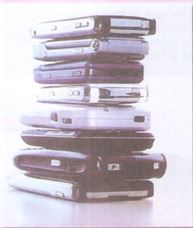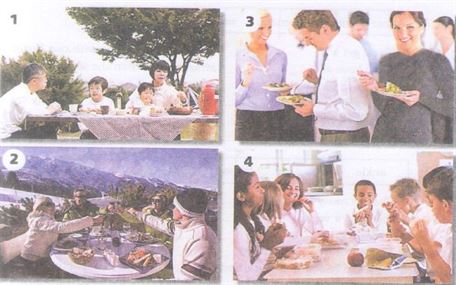fce grammar about reporting speech
چگونه در کتاب اف سی ای درباره ی نحوه ی غذا خوردن صحبت کنیم

Language focus 3: Reported speech
1 Look at the following example of direct speech from the text, together with a reported version. What change is made to the tense of the verb when it is reported?
Direct speech : a 'We're meeting her tomorrow.'
Reported speech: Jordan said he didn't want to lecture people.
In this case, the following sentence without the tense change is also possible. Why?
Jordan said he doesn't want to lecture people.
2 Complete the columns below, to show how verb tenses and other words and expressions can change in reported speech. Write either one or two words in each space. The first one has been done for you.
Direct speech Reported speech
a 'We're meeting her tomorrow.' They said they were meeting her the next day.
b 'I've seen him twice today. She said she him twice day.
c 'She's been living here for years.' He told me she living for years.
d 'I spoke to her last week.' He said he to her week.
e 'I was working yesterday. He told me he working before.
f 'We'd asked her several times.' They said they her several times.
3 Name the tense in each sentence in exercise 2.
Example: a present continuous past continuous
4 What happens to the modal verbs will, may, can and must in reported speech?
What happens to would, might, could, should and ought to?
5 What happens to these time expressions in reported speech?
two days ago next month tonight this morning now
Check your ideas on page 219 of the Grammar reference.
6 a Write down at least five things that different people have said recently. Think about the following people:
family and friends teachers classmates work colleagues newsreaders
politicians sportsmen and other famous yourself women people
Example:
'I think I'll be fit for the match on Saturday.' (Steve James - footballer)
b Report the different statements to your partner using reported speech.
Example:
Steve James said he thought he would be fit for the match on Saturday.
Reading and Use of English
Part 2
Open close

1 For some people, placing your elbows on the table at mealtimes is bad manners. Give examples of what you consider to be good and bad table manners.
2 For questions 1-8, read the text below and think of the word which best fits each gap. Use only one word in each gap. There is an example at the beginning (0). Write your answers IN CAPITAL LETTERS.
Table manners Perhaps because many families no longer eat together (0) ON a regular basis, very ( 1) attention seems to be paid any more to the teaching of good table manners. It is not at (2) uncommon nowadays to see people with their elbows on the table, speaking with their mouth full, or worse, answering their phone or writing on email mid-meal. In one recent UK survey, nearly a quarter of adults and slightly more (3) a third of teenagers admitted to using their smortphone during mealtimes. In an attempt to discourage mobile phone use (4) the meal table, blogger Brion Perez invented the Phone Stock game, in (5) diners place their phones face down in the middle of the table in a stock, (6) on top of the other. The first person (7) look at his or her phone has to pay the whole bill; if, however, by the end of the meal, the stock remains untouched and (8) phone has been turned over, everyone wins and pays for their own meal.
3 Do you consider using the phone during meals to be bad manners? Why/Why not?
How important do you think table manners are? Why?
Speaking
Part 2
Talking about photos
How are the people feeling?

1 Look at the photographs, which show people eating in different places.
Student A Compare photographs 1 and 2 and say how you think the people are feeling.
Student B When your partner has finished, say which of these places you would prefer to eat in.
2 Now change roles. Follow the instructions above using photographs 3 and 4.
Language focus 4: Reporting verbs
1 Look at these different ways of reporting what people say:
a 'I'll get you a drink,' said Jan to Tom.
Jan told Tom she would get him a drink.
Jan offered to get Tom a drink.
b 'You should go and see a doctor,' said Tim.
Tim said I should go and see a doctor.
nm advised me to go and see a doctor.
2 Which of the following verbs follow the same pattern as advise (verb + object + infinitive with to) and which are like offer (verb + infinitive with to)? Make two columns in your notebook.
order urge refuse threaten persuade warn tell remind ask promise encourage
recommend
3 Report the following sentences using an appropriate verb from exercise 2. There is an example at the beginning (0).
0 'I'll give you the £5 back tomorrow,' he told her.
He promised to give her the £5 back the next day.
1 'I'm not going to clean my room!' she said.
She .
2 'Don't forget to take your sandwiches, John,' said his father.
John's father .
3 'If you don't turn your music down, I'll call the police,' said my neighbour.
My neighbour .
4 'Don't take the car out. The roads are very icy,' said her friend.
Her friend .
5 'Get out of my office immediately!' shouted his boss.
His boss .
6'You really ought to report the theft to the police' my friend told me.
My friend .
4 Look at the following structures which can follow the verb recommend.
The doctor recommended him to do exercise.
The doctor recommended (that) he (should) do exercise.
The doctor recommended doing exercise.
Which structure is not possible with the verb suggest?
5 Work with a partner. You each have various problems and you would like your partner's suggestions and advice. Student A should turn to page 202 and student B to page 205 to find out what your problems are.


